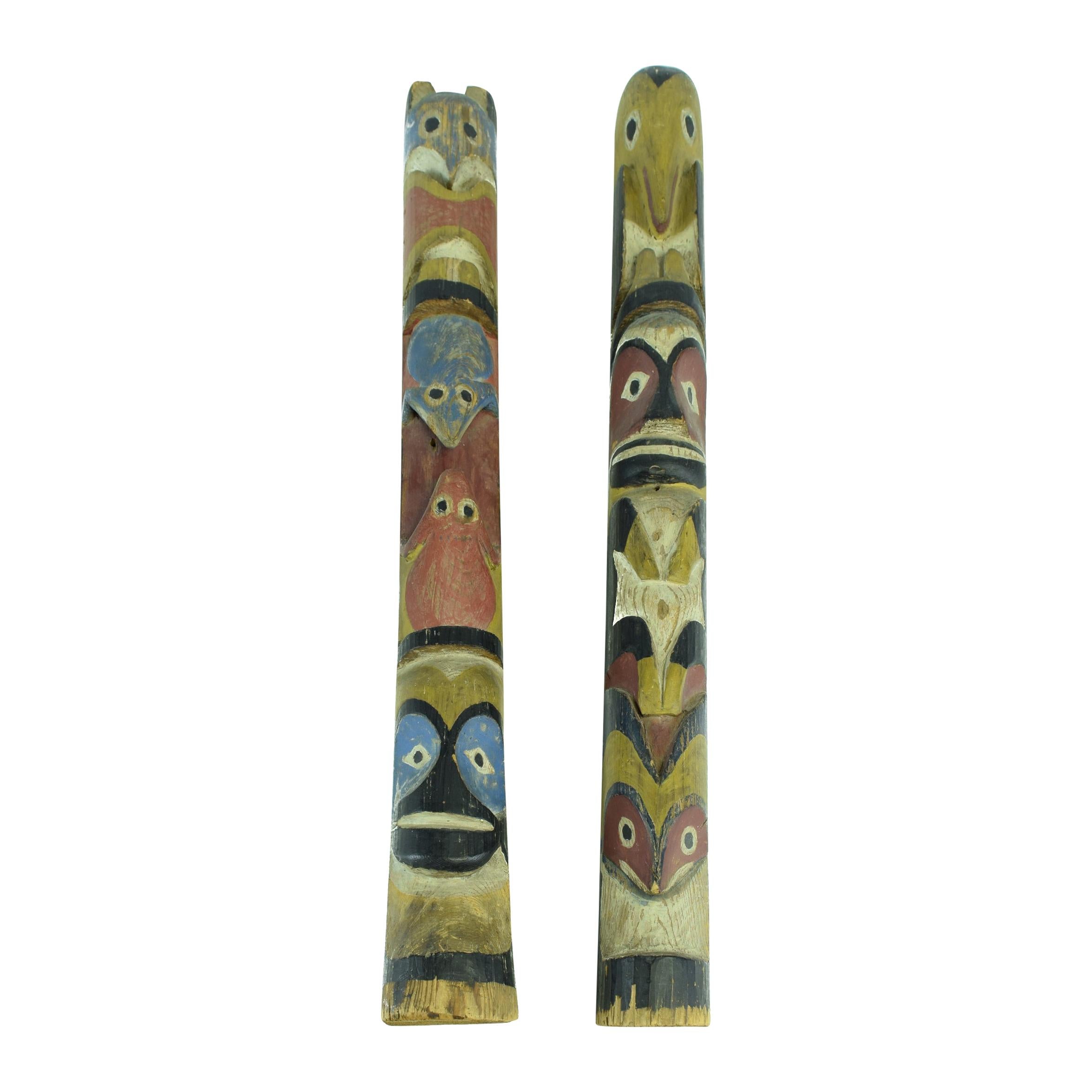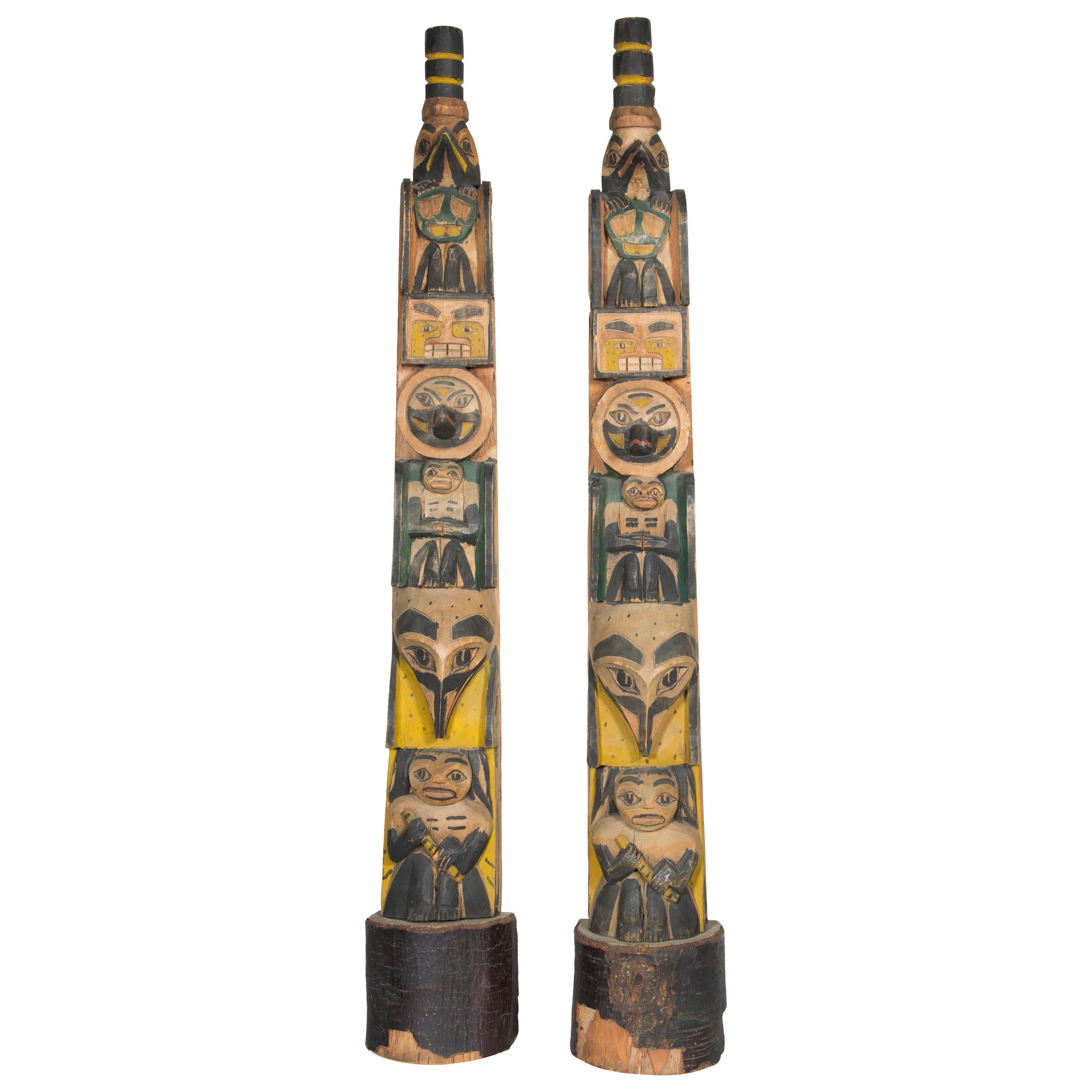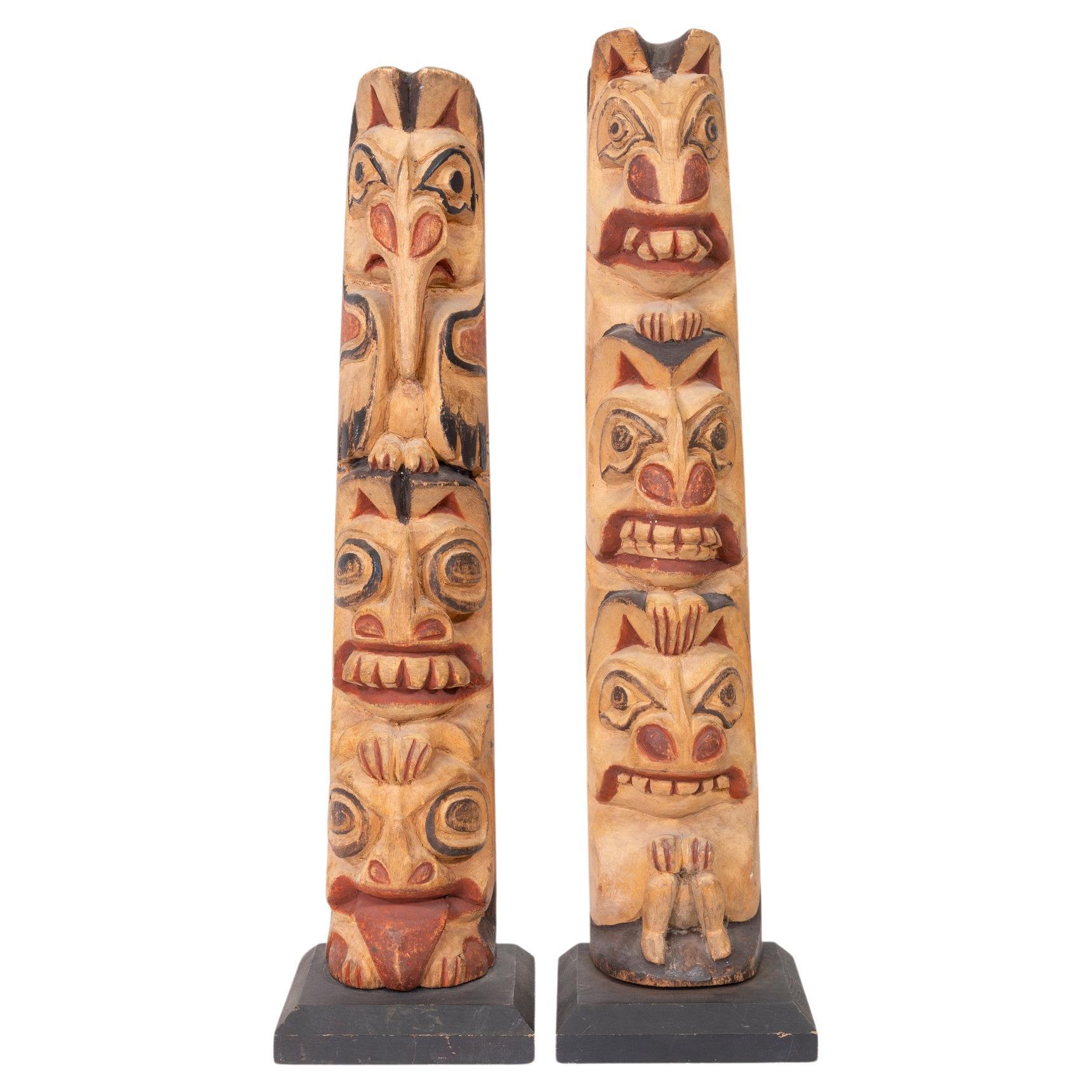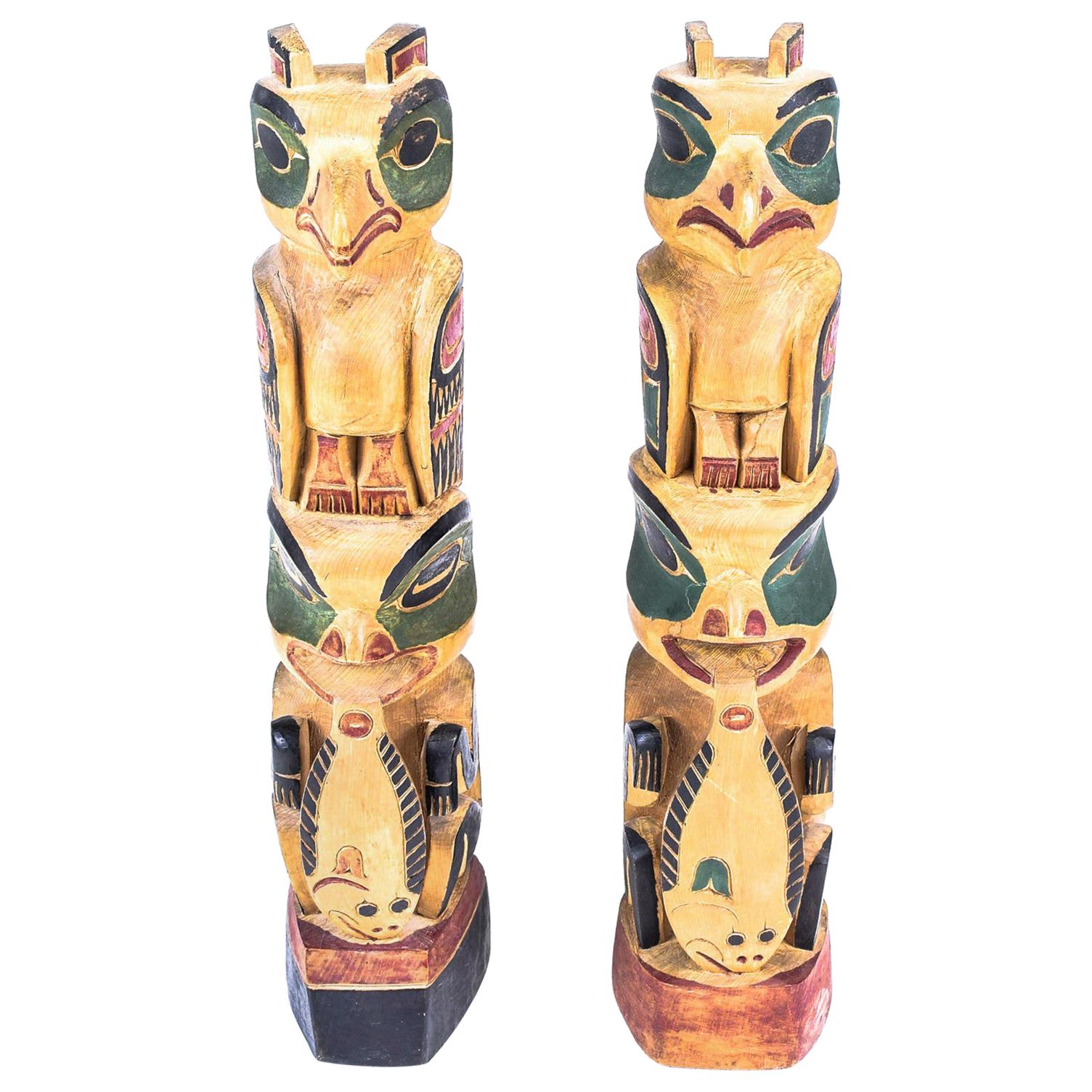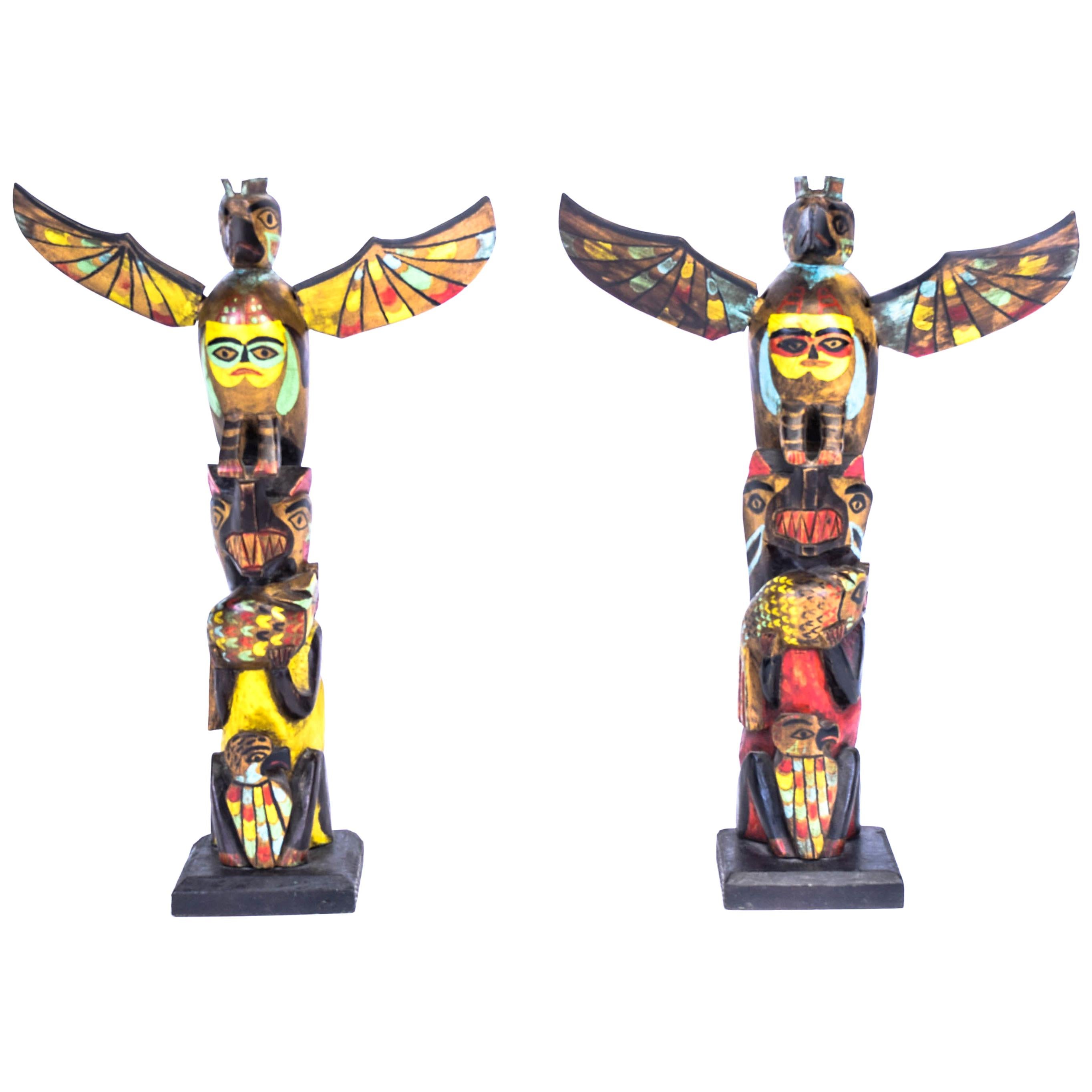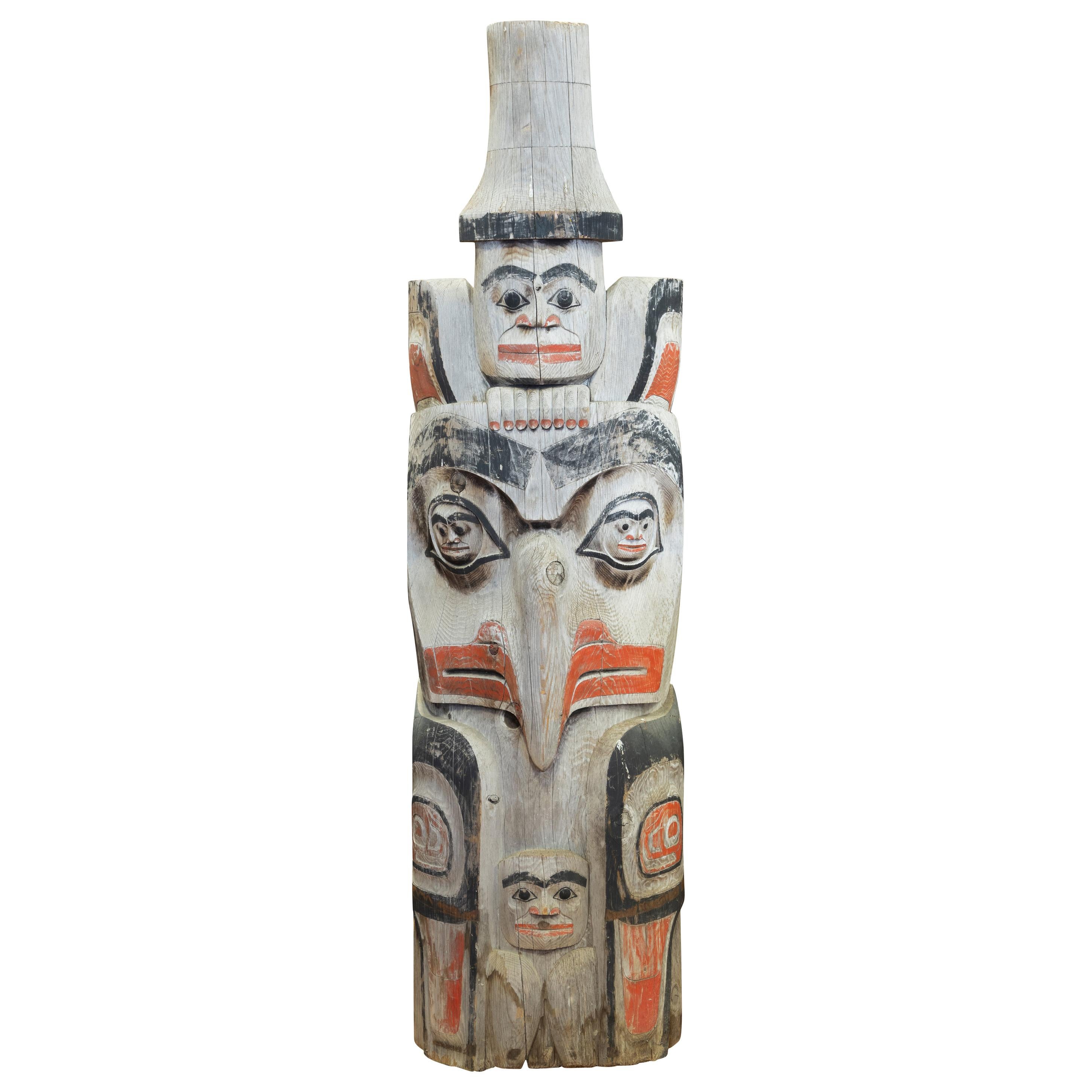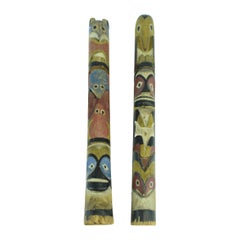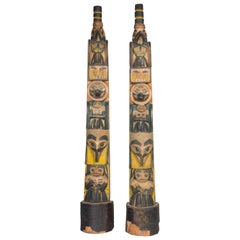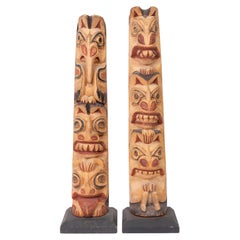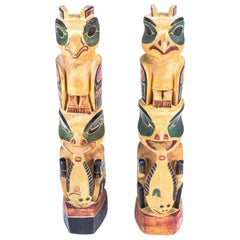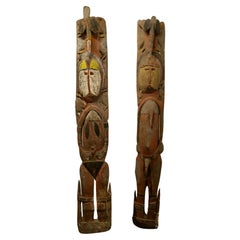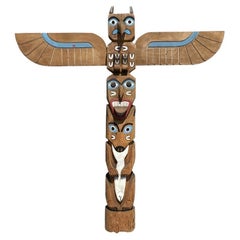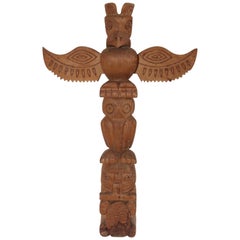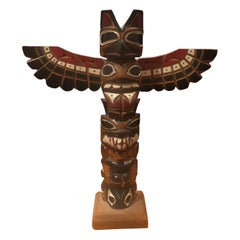Items Similar to Massive Pair Native Salish Carved Totems
Want more images or videos?
Request additional images or videos from the seller
1 of 10
Massive Pair Native Salish Carved Totems
$44,000per set
£32,933.35per set
€38,054.87per set
CA$61,013.33per set
A$68,342.77per set
CHF 35,530.64per set
MX$843,895.69per set
NOK 452,632.44per set
SEK 427,893.55per set
DKK 283,986.28per set
Shipping
Retrieving quote...The 1stDibs Promise:
Authenticity Guarantee,
Money-Back Guarantee,
24-Hour Cancellation
About the Item
Matched pair of Salish Native American totem poles. Both identical. Carved as a thunderbird with spread rings separately carved and attached perched on the head of a human over a seated bear figure with a frog emerging from the ursine mouth. Original paint is weathered. One pole hollowed out in the traditional fashion. The other not. Measures: 104" H x 82" W, 107" H x 91" W.
Period: Last quarter 20th century
Origin: Salish
Size: 104" H x 82" W, 107" H x 91" W
Family Owned & Operated
Cisco’s Gallery deals in the rare, exceptional, and one-of-a-kind pieces that define the history of America and the Old West. Our pieces range from American Indian to Cowboy Western and include original items of everyday life, commerce, art, and warfare that tamed America’s frontier. Our 14,000 square foot gallery opened in 1996 in beautiful Coeur d’Alene, Idaho.
Personal Service
Cisco’s operates on old fashioned values – honesty and integrity, and all of our items are backed by our money back guarantee. We appreciate the opportunity to earn your business. Whether you desire assistance with a jewelry purchase, choosing a gift, identification, or even selling – we hope to be your trusted source.
Carvings, Totems, Totem Poles, Native American, Carvings.
- Creator:Native American Art (Maker)
- Dimensions:Height: 107 in (271.78 cm)Width: 91 in (231.14 cm)Depth: 18 in (45.72 cm)
- Sold As:Set of 2
- Style:Native American (Of the Period)
- Materials and Techniques:
- Place of Origin:
- Period:
- Date of Manufacture:1980
- Condition:Wear consistent with age and use.
- Seller Location:Coeur d'Alene, ID
- Reference Number:Seller: AF02461stDibs: LU4019323795262
About the Seller
5.0
Gold Seller
Premium sellers maintaining a 4.3+ rating and 24-hour response times
Established in 1996
1stDibs seller since 2018
244 sales on 1stDibs
Typical response time: 5 hours
- ShippingRetrieving quote...Shipping from: Coeur d'Alene, ID
- Return Policy
Authenticity Guarantee
In the unlikely event there’s an issue with an item’s authenticity, contact us within 1 year for a full refund. DetailsMoney-Back Guarantee
If your item is not as described, is damaged in transit, or does not arrive, contact us within 7 days for a full refund. Details24-Hour Cancellation
You have a 24-hour grace period in which to reconsider your purchase, with no questions asked.Vetted Professional Sellers
Our world-class sellers must adhere to strict standards for service and quality, maintaining the integrity of our listings.Price-Match Guarantee
If you find that a seller listed the same item for a lower price elsewhere, we’ll match it.Trusted Global Delivery
Our best-in-class carrier network provides specialized shipping options worldwide, including custom delivery.More From This Seller
View AllPair of Nuu-chah-nulth Model Totems
By Native American Art
Located in Coeur d'Alene, ID
This pair of colorful larger Nuu-chah-nulth model totem poles were likely made for a curio shop in Seattle or Victoria sometime around 1915. The poles...
Category
Vintage 1910s Canadian Native American Native American Objects
Materials
Cedar
$9,900 / set
Circa 1900 Pair of Northwest Coast Totems
By Native American Art
Located in Coeur d'Alene, ID
Matching pair of Northwest Coast carved model totem poles. Polychrome decorated with carved humanoid and bird figures. Each twice signed "Betty Sanners" back and bottom. Provenance Hudson Bay Fur Company, Seattle, Washington. 29"H
Period: Early 20th century
Origin: Northwest Coast
Size: 29" base 4 1/2 x 3 1/2
Family Owned & Operated
Cisco’s Gallery deals in the rare, exceptional, and one-of-a-kind pieces that define the history of America and the Old West. Our pieces range from American Indian to Cowboy Western and include original items of everyday life, commerce, art, and warfare that tamed America’s frontier. Our 14,000 square foot gallery opened in 1996 in beautiful Coeur d’Alene, Idaho.
Personal Service
Cisco’s operates on old fashioned values – honesty and integrity, and all of our items are backed by our money back guarantee. We appreciate the opportunity to earn your business. Whether you desire assistance with a jewelry purchase, choosing a gift, identification, or even selling – we hope to be your trusted source.
Native American carvings & totems native American Indian native American totem poles n.
Category
Antique Early 1900s American Native American Native American Objects
Materials
Cedar
$9,900 / set
Pair Northwest Coast Cedar Totems
Located in Coeur d'Alene, ID
Northwest coast cedar TOTEM. Signed in pencil on back, "Susan Peters." We assume a former owner. Base is contemporary, almost matching totems. Carved o...
Category
Antique Late 19th Century American Native American Sculptures and Carvings
Materials
Cedar
Pair of 1930s Tlingit Totems
Located in Coeur d'Alene, ID
Tlingit culture is divided into two moieties, or groups: Eagles and Ravens. These groups, also called clans, are exogamous – which means they marry out to the other group – and are m...
Category
Vintage 1930s American Native American Native American Objects
Materials
Cedar
$8,250 / set
Pair of Nuu-Chah-Nulth Model Totems
By Native American Art
Located in Coeur d'Alene, ID
This matched pair of Nuu-chah-nulth model poles each feature thunderbirds, wolves, lightning snakes and eagles. The poles are nearly identical and vary only in minute details and color choices. The thunderbirds...
Category
Vintage 1920s Canadian Native American Native American Objects
Materials
Cedar
$8,800 / set
Salish Carved Cedar TOTEM
By Native American Art
Located in Coeur d'Alene, ID
Salish TOTEM depicting a human wearing a potlatch hat perched between the ears of an eagle at top, a human face in relief for the birds eyes, a small humanoid/bird figure standing at...
Category
Late 20th Century American Native American Native American Objects
Materials
Cedar
$22,000
You May Also Like
Very Tall Pair of African Marriage Figure Panels This is a very heavy pair
Located in Godshill, Isle of Wight
Very Tall Pair of African Marriage Figure Panels
This is a very heavy pair of large full-length figures, wall panels, they are African, carved and polychrome painted, modelled as a ...
Category
Antique 19th Century Folk Art Sculptures and Carvings
Materials
Teak
Monumental Native American Hand Carved, Painted & Signed Totem Pole
Located in Bridgeport, CT
The monumental hand carved totem pole depicting a winged bird atop a figure and surmounted on a fox or bear holding a fish prey. Hand painted predomi...
Category
20th Century North American Tribal Native American Objects
Materials
Wood
North West Coast Indian Totem Pole
Located in Los Angeles, CA
This North West Coast Indian totem pole has fantastic carving and condition. It is unsigned or dated. Found in California. This table top totem...
Category
Mid-20th Century American Adirondack Native American Objects
Materials
Wood
$956 Sale Price
20% Off
Nuu-chah-nulth Northwest Coast Hand Carved Wood TOTEM Pole by Ray Williams
Located in San Diego, CA
A fine example attributed to master Nuu-chah-nulth carver Ray Williams, circa 1960s. Ray Williams was the son of famed carver Sam Williams who started car...
Category
Mid-20th Century Canadian Native American Native American Objects
Materials
Wood, Paint
$600 Sale Price
20% Off
Hand Carved Wood Totem Pole
Located in San Diego, CA
A very nice hand carved and painted wood totem pole, circa 1970s. The totem stands and 26" H with a 16.5" wingspan and is in excellent condition for its age...
Category
Mid-20th Century Canadian Native American Native American Objects
Materials
Wood, Paint
$400 Sale Price
20% Off
John Williams Signed Indigenous American West Coast Haida Styled Totem Pole
Located in Hamilton, Ontario
This Indigenous American totem pole was done by the renowned master carver John T. Williams of the United States in approximately 1960 in his signa...
Category
Mid-20th Century American Native American Native American Objects
Materials
Cedar
More Ways To Browse
Native American Jewellery
Native American Jewlery
Folk Art Bear
Carved Pole
Retro Art Carved Rings
Totem Carving
Indian Head Ring
Frog Service
Retro Frog Ring
Salish Indian
Thunderbird Totem
Carved Frog Ring
Totem Pole Salish
Vintage Indian Head Ring
Native American Thunderbird Ring
Vintage Thunderbird Ring
West Coast Totem Pole
Antique Indian Beadwork
